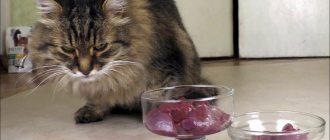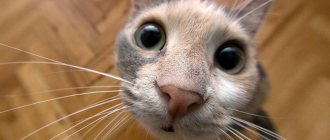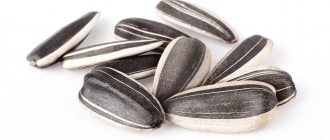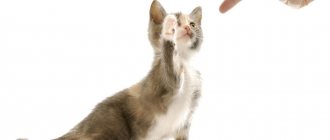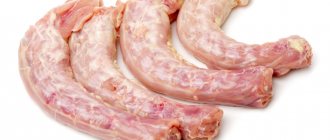Many owners try to pamper their beloved pets with all sorts of treats. What about sweets: is it possible to give them to cats, will they harm the health of the tailed cats? We are touched when we see a cat licking the cream from a cake or gnawing chocolate with pleasure. It seems to us that they have the same sweet tooth as their owners. But the situation is completely different: cats are attracted not to sugar, but to other substances.
Cat's sensitivity to sugar
By nature, cats are predators; they lack the gene responsible for the ability to sense sweetness, so their receptors simply do not distinguish between sugar. Then why do cats like sweets and do not refuse a tasty piece of cookies or chocolate?
Why cats can't distinguish the taste of sweets
Cats love sugar - this is a myth made up by pet owners without veterinary education. In fact, representatives of the cat family at the genetic level are simply not able to understand what sweet taste is.
As a result of a study conducted in 2005 at the Monell Chemical Senses Center in Philadelphia, the non-functionality of the Tas1r2 gene in cats was proven. It is he who is responsible for the perception of sweetness.
The mutations appeared to be common throughout the cat family, but it was not clear whether this was a random feature or related to diet. After all, sugars are found mainly in plant foods, and predators are not interested in grass - therefore, they do not need the ability to sense sweetness.
Based on this, zoologists came to the conclusion that because cats do not feel sugar, they cannot control the amount of sugar they consume. Carbohydrates harmful to the animal penetrate the body unnoticed, leading to serious consequences for the health of the animal.
Why do cats still eat sweets?
Cat receptors do not distinguish between sweets, but they sense other components: vegetable fats, milk protein, amino acids. Hence the love for creamy and milk-containing desserts, as well as baked goods. Here's what experts say when justifying animals' sweet tooth:
- all predators need protein in large doses: they recognize it in “delicacies” that are made on the basis of milk and vegetable fats (ice cream, condensed milk), and sugar is a by-product that is useless for cats;
- many desserts contain synthetic additives with a pleasant smell that stimulates appetite;
- the pet’s diet is incorrect and there is a lack of carbohydrates;
- the animal lacks vitamins and minerals;
- the habit of eating from the table or from your hands makes you react to any treat.
Owners should know: an excess of simple carbohydrates can lead to severe poisoning. Is it worth exposing your pet to such a risk and giving cats sweets?
In what form can a cat eat sweets?
Nature has not endowed the cat’s body with the ability to synthesize insulin, which breaks down sugar; large amounts of glucose are simply not absorbed. Therefore, all confectionery products, sweet yoghurts, and drinks are prohibited to those with a mustache, even if they express a desire to treat themselves.
This happens in the case of vitamin deficiency, the desire to get food from the owner’s hands, sympathy for a certain consistency of food, or a tempting aroma.
You can offer your cat a healthy alternative - apple, plum, pear, apricot, blueberries, raspberries, strawberries. Many people like honey, but the product is a strong allergen; it is necessary to introduce it into the diet in small doses, monitoring the body’s reaction.
Dry and fresh fruits do not force the cat to eat if he doesn’t want to. Wanting to give your pet a cooling treat, they freeze natural milk. Cats happily eat this homemade ice cream; the lack of sugar in it does not bother the animals.
The right sweet foods, eaten voluntarily by your pet, will benefit your health and become a source of pleasant emotions, vitamins, fiber, and valuable microelements. You shouldn’t humanize a cat by thinking that it gets tired of eating a high-quality, complete, but monotonous menu. What do you give your pet for dessert?
Deny or allow?
The main reason why cats cannot eat sweets is the presence of sugar in treats. As the famous saying goes, sugar is sweet poison, and for cats it works one hundred percent.
Is it possible to give cats sweets at least in small quantities? This is a question that each owner answers for himself, based on many factors: the recommendations of the veterinarian, the general health of the pet, its character and personal relationship with it. After all, everyone knows that cats remember refusals, get offended, and the most characteristic ones can even take revenge.
It often happens that the animal begs for sweets. In this case, veterinarians recommend giving your pet a microdose of treats. It is unlikely that anything terrible will happen to him from a drop of condensed milk or yogurt. The main thing is to do it in doses, preferably as encouragement.
Another way to limit sweets is to outwit your pet by switching his attention to a healthy treat designed with all his needs in mind. Now there is a huge selection of such “desserts” for cats. They are available not only in different flavors, but also in a wide variety of formats and textures: straws, cream, fillets, purees, rolls, etc.
If you suddenly haven’t taken care of your furry friend and he has eaten too much condensed milk, chocolate, cookies or ice cream, it is important to take him to the veterinarian for an examination, donate blood and monitor his blood glucose levels. This will help prevent dangerous diseases.
What to do if your cat ate chocolate?
- First, try to estimate how much chocolate your pet has eaten.
- Check the composition of the chocolate and watch the cat.
- Try getting him to drink more water.
- If you notice any alarming symptoms, take him to the vet and be sure to tell him what and how much your cat ate.
It's true that a cat would have to eat an entire bar of high-contaminant chocolate to be considered mortal. So can cats eat chocolate? Absolutely not! Even small doses of this product harm the digestive system, heart and brain. They also dehydrate the cat, which is especially dangerous.
How sugar can harm you
All sugar-containing treats pose a serious danger to cats of all ages, but pregnant and lactating females, small kittens and older cats are most affected. With prolonged consumption of foods containing sugar, even the healthiest animals can develop diseases.
Gastrointestinal disorders
An excess of sweets can cause stool disorders (diarrhea or constipation), gastritis, various types of colitis, and even inflammation of the pancreas. These troubles take a long time to treat, it is difficult, and the animal will have to be on a strict diet.
Development of diabetes
When a cat eats sweets, even in small quantities, the pancreas gets severe overload. If this happens regularly, inflammation develops, leading to organ destruction. Insulin production stops and the cat’s blood sugar rises. By the way, sweeteners (for example, xylitol), added by manufacturers to sweeten foods, also contribute to the development of diabetes. Without maintenance therapy, the life of a diabetic cat is shortened.
Harm to the kidneys and liver
If a cat loves sweets, the risk of urolithiasis increases - the load on the kidneys increases, the acid-base balance is disrupted. KSD causes frequent painful urination and sometimes requires surgical intervention.
Irreversible changes occur in the liver - working tissues are replaced by useless fatty layers. This means that the organ will not be able to remove toxins and waste products as well as before.
Weakening of the immune system
When sugar enters the intestines, the number of protective cells decreases many times, which has a bad effect on the animal’s immunity. The cat becomes unstable to bacterial and viral attacks, even if it is vaccinated. In severe cases, disruptions occur in the endocrine system.
Fat deposits
Pets do not use as much energy as outdoor pets. As a result, fat deposits accumulate, both subcutaneous and internal. The latter envelop the organs, as a result their performance decreases.
Obesity leads to a lot of health problems: from diseases of internal organs to arthritis and arthrosis.
Diseases of the teeth and oral cavity
The cause of microcracks in tooth enamel is sweetened food. It also provokes the appearance of caries, tartar, bleeding gums, and tooth loss. The main problem is that sugars wash out calcium in the body, which has a bad effect on the condition of teeth and bones. And treating dental problems in animals is complex, difficult and very expensive.
Allergy
The liver and pancreas process and utilize carbohydrates in the body. If an animal consumes a lot of harmful treats, these organs do not have time to process sugar and, as a result, a lot of glycogen accumulates in reserve. At one point, the body begins to react to excess carbohydrates as an allergen. So if your cat starts itching or has discharge from her eyes, immediately stop giving her harmful treats.
Is it possible to give sweets to cats?
Of course, a cat won’t die from one cookie, but why give your pet something that harms it? Fast carbohydrates contribute to changes in eating behavior: they instantly fill you up and dull the feeling of hunger for a short period. Sugar is quickly absorbed and hunger returns.
Be sure to read:
When to start feeding kittens: how to introduce them, diet, what not to feed, age for first feeding
Excess calories become fat. Excess body weight creates unjustified additional stress on the heart, lungs, joints, and circulatory system, and hormonal balance is disrupted.
It is especially harmful to give chocolate to cats. Caffeine excites the central nervous system, increases blood pressure, makes the heart beat faster, and provokes muscle tremors. Large amounts of theobromine, which is found in all types of chocolate, can cause the death of an animal.
Cats that regularly consume illegal sweets suffer from:
- diabetes mellitus;
- blindness;
- fungal diseases;
- conjunctivitis;
- allergies, dermatitis;
- low immune defense;
- kidney and liver diseases;
- pathologies of the nervous, cardiovascular, and digestive systems.
Eating sugar can cause infertility in a cat, complicate the course of pregnancy, lead to the birth of still babies, and threaten premature aging.
What kind of ice cream can you give your pet?
How to refuse a cat who pityingly looks into your eyes or menacingly demands his portion of ice cream? Each cunning cat has his own ways of influencing the owner. It turns out that despite all the harmfulness of this product for a cat’s body, you can treat a cat with a small portion of ice cream. But it should be a really small portion, no more than two teaspoons. You can allow such a treat occasionally, but under no circumstances should you feed your animal ice cream on a regular basis.
Try making healthy ice cream for your pet - freeze natural yogurt, cream or goat's milk without added sugar and treat your pet in the hot weather. If your cat still prefers industrial ice cream, do not give him a chocolate treat. Chocolate is dangerous for cats.
Harm from ice cream
If the owner often pampers his pet with ice cream, sooner or later he will have to go to the veterinarian.
Cats, like people, digest milk well in childhood, but with age they lose this ability: the level of the lactase enzyme, which is responsible for the digestion of the milk sugar lactose, is extremely low in most adult animals. Yes, there are animals that can eat dairy products and feel great. The majority of cats will suffer from indigestion: suffer from bloating, pain and diarrhea, because milk, in contact with gastric juice, simply curdles without breaking down into its components. The liquid substance passes through the entire intestinal tract and irritates its walls. The body becomes dehydrated, and not only the digestive system suffers from this. This means that you cannot constantly feed your pet ice cream. When an animal eats tasty but not the healthiest food, it becomes full, but does not receive the components it needs for health, such as taurine, an essential amino acid. This is something to keep in mind.
Sweets and health problems
First of all, the consumption of sweets by cats, even not in very large quantities, can cause a weakening of the immune system. It doesn’t sound very scary, because you might now be thinking, why worry about why cats eat sweets, because you can simply add vitamins to the diet that will create a response effect on the immune system.
But it doesn’t work that way - such tug-of-war with health can cause quite severe poisoning, which can develop into more serious diseases that will be much more difficult to cope with.
- Wet food for cats - rating of the best foods, an overview of their compositions and reviews of veterinarians (120 photos)
Proplan food for cats: analysis of the composition, veterinarian reviews, price and advice on choosing food (105 photos)
Hills food for cats: review of composition, recommendations for selection and tips for use in the diet (130 photos)
Yes, and all this is because of simple sweets in the cat’s diet. Well, or rather, sweets that contain a lot of sugar.
This is what will happen to cats that eat sweets in abnormal quantities, but they can still be given it if the cat loves something very much, it just needs to be done in very limited portions.But what is sugar? It is essentially glucose, which is also found in fruits. Because of such products, if they are abused, small ulcers may begin to appear in the oral cavity, as a result of which a general itching of the body often begins.
Exceptions
But you shouldn’t paint everything with the same brush, because there are situations when your cat still needs sugar.
This is usually associated with various diseases or the postoperative period, when the amount of glucose in the blood greatly decreases.
How to feed a neutered cat - tips on choosing a diet for a sterilized cat at home (90 photos)Felix food for cats: reviews, composition overview, use in the diet, price and food combinations (125 photos)
What to feed a sterilized cat: video tips on how to properly, what and when to feed a cat after sterilization (125 photos + video)
In this case, even the veterinarian himself will tell you what needs to be changed in the animal’s diet, albeit temporarily.
How else can you explain your craving for sweets?
It really seems strange. If their bodies suffer so much from desserts, why do they make so much effort to find and eat sweets? Experts in the field of animal nutrition note the following points:
- The reason is the flavorings that awaken the appetite.
- They may like the consistency of the sweet dish.
- If your pet's diet is unbalanced, this leads to a carbohydrate deficiency. Of course, sweets are the easiest way to make up for their lack.
- Vitamin deficiency is another condition in which a cat tries different foods to make up for the deficiency.
- Some cats love to eat from their owner's hands so much that they will beg for anything.
As you can see, there are quite a few reasons. But the answer to the question of whether a cat can have sweets or not remains the same. No, the predator has no use for it at all.
Favorite treats
Some of the sweet preferences of cats include chocolate, ice cream and sucking candies (on a stick, caramels).
Most owners admit that they can sometimes give their cats sweets, but very little, as a treat. The difficulty is that sweets do not cause immediate harm, that is, the cat does not feel ill immediately after eating a piece of ice cream. Any experienced owner and veterinarian will tell you that giving them chocolate is a big mistake. Real chocolate is poison for cats and dogs. For poisoning, which leads to liver failure, a large dog needs to eat a chocolate bar (100 grams), while a cat needs 30–40 grams. Naturally, we are not talking about a surrogate treat, but about real chocolate, which contains cocoa and caffeine.
Warnings about the dangers of chocolate are based not only on experience, but also on research. Veterinarians monitored the dynamics of poisoning and the rate of its progression. Anamnesis collection and autopsy testimony allowed us to draw clear conclusions - the animals died from chocolate poisoning.
Even special chocolate treats sold in pet stores are not as harmless as they say on the packaging. As mentioned above, there is no point in such treats, because cats cannot like sweets due to the fact that they do not feel this taste.
The favorite treat of adults, children and cats is ice cream. It would seem that a dairy product should not be harmful, but everything is not so simple. Firstly, there is sugar in ice cream, and secondly, the store-bought product hardly contains milk. Even if we take ice cream as an example, which was once produced according to GOST, it contained cream and butter - extremely harmful products for a cat’s liver. A cat that has received too much sugar suffers from intoxication, in other words, from poisoning.
Another favorite treat is condensed milk. The logic of the owners is similar, although the milk may be sweet, it means it cannot be harmful. The warnings are the same: condensed milk contains a lot of sugar, and the store-bought product includes preservatives, flavors, unnatural sweeteners and exclusively powdered milk. The cat does not feel the sweet taste, powdered milk is not beneficial, so is there any point in treating it with such a treat?
What could be healthier than fermented milk products for cats who love milk? Every guide to feeding four-legged animals recommends diluting the cat’s diet with yogurt, kefir, fermented baked milk, etc. However, not every guide specifies that the products must be natural and not store-bought. Only in this case can we talk about real benefits.
When consuming store-bought dairy products with sweeteners, a cat may suffer from chronic conjunctivitis, and this is not a coincidence. Many owners didn't know how to eliminate bad odor from their cat's ears, and it can also be caused by eating sugar.
The owners of sweet dogs can only wish patience in re-educating their charges. Try to balance the diet, take a vitamin course and gradually wean your cat off sugar. If your nervous system cannot withstand the onslaught of pleading eyes, offer your cat a piece of dried apricots (no raisins) or peanuts. These products are not healthy for the cat and contain a lot of carbohydrates, but are safer than sugar.
Another safe alternative is special treats (sweet) for animals, which are sold at the pet store. However, be careful, many owners have weaned cats from eating sugar in favor of treats, but they cannot exclude them from the diet. It is important that any additives to the main diet are strictly rationed.
Cats' taste buds do not recognize the taste of sweet foods. However, many furry pets show serious interest in various desserts. An owner who wants to pamper his pet with a tasty treat must first figure out whether cats can eat sweets and what consequences can arise from eating foods containing glucose.
In our article we will talk about sweet dishes for animals and, of course, we will answer the most important question - is it possible to give sweets to cats and discuss the harm such food brings to the health of the animal.
It’s clear what causes cats’ passion for chocolate, but why not give the cat a piece of another? Any veterinarian will categorically answer that chocolate is a real poison for animals, including cats. It contains components such as theobromine and methylxanthine, an excessive amount of which in a pet’s body can cause the death of a four-legged friend.
Again, it is worth focusing on the fact that a cat, without a sense of taste, does not have the opportunity to independently limit the consumption of a harmful product and may well eat a large amount of chocolate. Consuming large amounts of theobromine can lead to a number of dangerous symptoms:
- rapid heartbeat (tachycardia);
- neurological manifestations;
- uncontrollable convulsions.
Ice cream is a favorite dessert of many cats; at first glance it may seem like a completely harmless treat, because it is based on dairy products - milk, cream, butter. However, do not forget that even the highest quality product contains sugar. Once in a cat's body, it can cause an overdose of sugar, which often leads to severe intoxication. The pet may suffer from vomiting, diarrhea and other unpleasant symptoms.
Condensed milk, although it is essentially milk, contains an excessive amount of sugar. Such a combination of components can cause diarrhea and vomiting in the pet, the cat becomes lethargic, refuses food, and inflammation of the conjunctiva develops, which manifests itself in the form of copious purulent discharge along the edges and corners of the eyes.
It is worth remembering that not all fermented milk products are healthy for cats. If you can give kefir or yogurt, then it is better to avoid cheese curds, fruit curds, and yogurt with various additives. Such food with a high carbohydrate part should not be present in the animal’s diet. It is not recommended to treat your cat with sweet nuts and dried fruits, as they contain a high level of carbohydrate components.
We suggest you read: How to cure acne in cats

